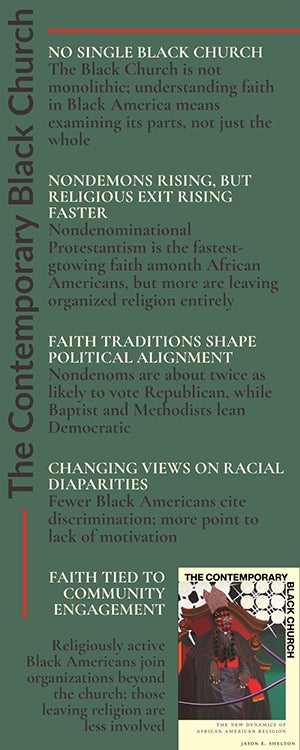 Director Todd Ferguson hosted sociologist Jason Shelton to kickstart the Religion and Public Life Center’s Fall 2025 Religious and Civic Leader Gatherings. The discussion centered on Shelton’s latest book, The Contemporary Black Church, which examines the current state of “the Black Church” while correcting some misconceptions.
Director Todd Ferguson hosted sociologist Jason Shelton to kickstart the Religion and Public Life Center’s Fall 2025 Religious and Civic Leader Gatherings. The discussion centered on Shelton’s latest book, The Contemporary Black Church, which examines the current state of “the Black Church” while correcting some misconceptions.
Shelton argues that the widely used “RelTrad” survey lumps all African American congregations into one category of the Black Church, when in fact, the Black Church is diverse in terms of denomination, liturgy, and theology. He shared statistics illustrating that, on one hand, Black membership in Baptist and Methodist congregations is declining, while Black Pentecostal and non-denominational congregations are growing in numbers and Black Catholics have maintained their numbers. Furthermore, the church is no longer a "semi-involuntary” institution (think your mother or grandmother forcing you to attend), nor does it mediate access to education, power, and status, as increasing numbers of Black Americans are educated and enter the middle class. In fact, the middle-class lifestyle complicates life for some Black Americans (as it is known to do for other demographics) who end up foregoing church. Shelton also observed that educated young and educated Black Christians are frustrated in denominations that reserve leadership for older generations. Thus, they are leaving Baptist and Methodist churches for other Black denominations. Younger generations of Black Christians, post-Civil Rights era, are less concerned about liberation theologies and social justice that initially drew many to Methodist and Baptist congregations. Young Black Christians are growing in multi-racial societies where their rights are observed.
For Shelton, this myriad of factors show diversity as much as they complicate the category of Black Church and muddy a discussion of politics and voting choice. He encouraged denominations losing membership to “skip generations and get young people in leadership,” providing a way forward.
Watch the conversation on YouTube

